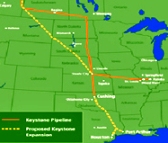US fuel makers use rail lines to tap Canadian oil
By BEN LEFEBVRE
Pipeline or not, lots of Canadian crude oil is headed to the US.
 As the fight over the Keystone XL pipeline drags on, US refining companies are turning to railroads to bring crude from Canada's oil sands to refineries along the Gulf of Mexico.
As the fight over the Keystone XL pipeline drags on, US refining companies are turning to railroads to bring crude from Canada's oil sands to refineries along the Gulf of Mexico.
Shipments are set to double this year, to more than 200,000 bpd, according to one estimate, as Valero Energy, Phillips 66 and other US fuel companies make an end run around the much-delayed pipeline.
TransCanada's Keystone XL pipeline expansion would bring even more oil -- 830,000 bpd, much of it heavy Canadian crude -- to the Gulf Coast hub, something refiners have spent years and billions of dollars preparing for.
TransCanada filed for a cross-border permit for the pipeline two years ago, but the pipeline become a flash point in the debate between advocates for North American energy supply and environmental activists worried about contamination from spills as well as increased oil consumption.
The White House isn't expected to make a final decision about the $7 billion pipeline project until this summer at the earliest.
Meanwhile, large amounts of the oil are piling up in the province of Alberta, driving its price down. Western Canadian Select oil prices recently averaged just over $65/bbl, two-thirds the price of US benchmark West Texas Intermediate.
Not surprisingly, refiners are eager for the cheap Canadian crude. "We want it on the Gulf Coast as soon as possible," said Bill Day, a spokesman for Valero, which recently bought 2,000 rail cars for moving crude oil to its refineries.
Some of those cars will make the trek from Alberta to Louisiana, where Valero is putting the finishing touches on multibillion-dollar processing units specially designed to handle heavy crude, which is tougher to refine than the light crude that has recently become abundant in the US.
It can cost $20 to ship a barrel of oil by rail from Alberta to the Gulf Coast, double the price for pipeline transit, according to Peters & Co., a Calgary-based investment-research firm. Even so, rail terminals in Alberta in 2013 will be able to double from the year before how much oil they load into rail cars to more than 200,000 bpd, or 6% of total Canadian oil exports, the firm said.
PBF Energy, which runs two East Coast refineries, said last month it would ship 80,000 bpd of heavy Canadian crude by rail to its refinery in Delaware, starting next year. And Phillips 66 CEO Greg Garland said earlier this year that the company was looking at heated rail cars to move heavy Canadian crude to its West Coast refineries.
"Crude from Alberta is going to make it to market no matter if Keystone XL gets built," TransCanada spokesman James Millar said. "This increase in the rail market, that just proves it."
Rail shipments haven't cut into interest in the pipeline expansion, which has 95% of its capacity contracted, Mr. Millar said, adding that Canada's crude-oil production will grow enough that pipelines, barges and rail cars will all have parts to play.
Some oil industry executives and analysts, meanwhile, have raised concerns about rail accidents involving carloads of crude oil, despite the rail industry touting a drop in accident rates in the past decade.
Refiners have already increased their rail capacity while waiting for pipeline construction to connect new oil fields in North Dakota and south Texas, where innovations in drilling techniques have led to increased oil production.
Producers of heavy oil are doing what they can do to help the process along. Meg Energy Corp. of Calgary plans to use Canexus Corp.'s new 70,000 bpd rail loading terminal to ship crude out of Alberta by midyear.
Even if it costs more to ship the barrels via rail than through a pipeline, Meg thinks it can make that money back -- and more -- if it can just get the oil to refiners in the Gulf Coast and Midwest.
"There's a higher cost by rail and barge, but it's the only way to realize higher prices," Meg spokesman Brad Bellows said.
Dow Jones Newswires






Comments